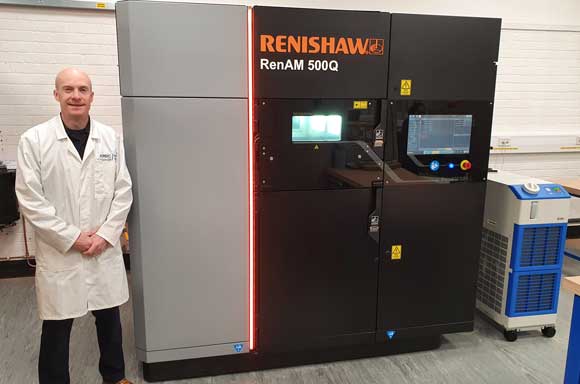New research project will use machine learning to advance metal alloys for aerospace
January 14, 2021

UK-based Intellegens, a University of Cambridge spin-out specialising in artificial intelligence; the University of Sheffield Advanced Manufacturing Research Centre (AMRC) North West, Preston, Lancashire, UK; and Boeing will collaborate on Project MEDAL: Machine Learning for Additive Manufacturing Experimental Design.
The project aims to accelerate the product development lifecycle of aerospace components by using a machine learning model to optimise Additive Manufacturing processing parameters for new metal alloys at a lower cost and faster rate. The research will focus on metal Laser Beam Powder Bed Fusion (PBF-LB), specifically on key parameter variables required to manufacture high density, high strength parts.
Project MEDAL is part of the National Aerospace Technology Exploitation Programme (NATEP), a £10 million initiative for UK SMEs to develop innovative aerospace technologies funded by the Department for Business, Energy and Industrial Strategy and delivered in partnership with the Aerospace Technology Institute (ATI) and Innovate UK. Intellegens was a startup in the first group of companies to complete the ATI Boeing Accelerator last year.
“We are very excited to be launching this project in conjunction with the AMRC,” stated Ben Pellegrini, CEO of Intellegens. “The intersection of machine learning, design of experiments and Additive Manufacturing holds enormous potential to rapidly develop and deploy custom parts not only in aerospace, as proven by the involvement of Boeing, but in medical, transport and consumer product applications.”
James Hughes, Research Director for University of Sheffield AMRC North West, explained that the project will build the AMRC’s knowledge and expertise in alloy development so it can help other UK manufacturers.
Hughes commented, “At the AMRC we have experienced first-hand, and through our partner network, how onerous it is to develop a robust set of process parameters for AM. It relies on a multi-disciplinary team of engineers and scientists and comes at great expense in both time and capital equipment.”
“It is our intention to develop a robust, end-to-end methodology for process parameter development that encompasses how we operate our machinery right through to how we generate response variables quickly and efficiently. Intellegens’ AI-embedded platform Alchemite will be at the heart of all of this.”
“There are many barriers to the adoption of metallic AM but by providing users, and maybe more importantly new users, with the tools they need to process a required material should not be one of them,” Hughes continued. “With the AMRC’s knowledge in AM, and Intellegens’ AI tools, all the required experience and expertise is in place in order to deliver a rapid, data-driven software toolset for developing parameters for metallic AM processes to make them cheaper and faster.”
Sir Martin Donnelly, president of Boeing Europe and managing director of Boeing in the UK and Ireland, reported that the project shows how industry can successfully partner with government and academia to spur UK innovation.
Donnelly noted, “We are proud to see this project move forward because of what it promises aviation and manufacturing, and because of what it represents for the UK’s innovation ecosystem. We helped found the AMRC two decades ago, Intellegens was one of the companies we invested in as part of the ATI Boeing Accelerator and we have longstanding research partnerships with Cambridge University and the University of Sheffield.”
He added, “We are excited to see what comes from this continued collaboration and how we might replicate this formula in other ways within the UK and beyond.”
Aerospace components have to withstand certain loads and temperature resistances, and some materials are limited in what they can offer. There is also simultaneous push for lower weight and higher temperature resistance for better fuel efficiency, bringing new or previously impractical-to-machine metals into the aerospace material mix.
One of the main drawbacks of AM is the limited material selection currently available and the design of new materials, particularly in the aerospace industry, requires expensive and extensive testing and certification cycles which can take longer than a year to complete and cost as much as £1 million to undertake.
Pellegrini explained that experimental design techniques are extremely important to develop new products and processes in a cost-effective and confident manner. The most common approach is Design of Experiments (DOE), a statistical method that builds a mathematical model of a system by simultaneously investigating the effects of various factors.
Pellegrini added, “DOE is a more efficient, systematic way of choosing and carrying out experiments compared to the Change One Separate variable at a Time (COST) approach. However, the high number of experiments required to obtain a reliable covering of the search space means that DOE can still be a lengthy and costly process, which can be improved.”
“The machine learning solution in this project can significantly reduce the need for many experimental cycles by around 80%. The software platform will be able to suggest the most important experiments needed to optimise AM processing parameters, in order to manufacture parts that meet specific target properties. The platform will make the development process for AM metal alloys more time and cost-efficient. This will in turn accelerate the production of more lightweight and integrated aerospace components, leading to more efficient aircrafts and improved environmental impact,” concluded Pellegrini.
Intellegens will produce a software platform with an underlying machine learning algorithm based on its Alchemite platform. It has reportedly already been used successfully to overcome material design problems in a University of Cambridge research project with a leading OEM where a new alloy was designed, developed and verified in eighteen months rather than the expected twenty-year timeline, saving approximately $10 million.
















